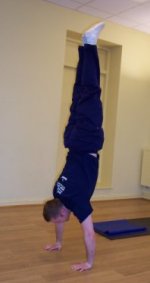I’ve updated the Back Bend Progress page with another photo taken today.
Cheers
Tim…
My thoughts about anything to do with flexibility and stretching…
Prior to catching this cold, there was some definite improvement in my back bends. Some of it is due to my shoulders opening up, making Urdhva Dhanurasana a little easier. I plan on taking some progress photos in a week, so I can show you the improvement over the last month. I just hope I can get rid of this cold and do some serious stretching over the next week, or the progress shots won’t show much progress. 🙂
Cheers
Tim…
In the page on Isometric Stretches I mentioned holding the tension on the final stretch. The idea being it helps to reinforce the new “safe” length as far as the stretch reflex is concerned. If I had my doubts before, I’m a believer now, and here’s why.
Over the last few days I’ve had a cold, so my stretching has been limited. Rather than doing isometric stretches I’ve just been doing some short reps of each stretch. Although my final position is comparable, I’ve noticed that my initial flexibility is quite poor. I know being ill directly affects your flexibility, but this difference seemed a little too extreme. As a result, I threw in an isometric session, and sure enough, my initial flexibility improved. I’ve still not shaken this cold, so improvements are non-existent, but I now firmly believe in holding the final tension to retrain the stretch reflex.
Cheers
Tim…
OK, I’ll admit it. My back bends are shocking! The truth of it is, my back isn’t naturally flexible, and back bends are hard work. I don’t feel my back in Urdhva Mukha Svanasana (Upward-Facing Dog) or Ustrasana (Camel Pose), but I do in Urdhva Dhanurasana (Upward Bow Pose, Backbend, Bridge, Crab or Wheel). The problem is, bridge is really tough on my wrists.
Over the last year, one of my friends has made some great improvements in his back bends just by plugging away at it. I’ve decided finally to bite the bullet and follow suit. Since Christmas this year I’ve been using the following program more or less every day:
Essentially, it’s just doing lots of bridge, but the ball takes the weight off my hands and lets me hold the posture for a lot longer than I would be able to without it.
My back bend is still shocking, but it’s improving. I’m going to try and get some progress shots done over the next few weeks, so you can see if it’s working. 🙂
Cheers
Tim…
I’ve been doing quite a bit of handstand practice recently. I’ve liked the thought of being able to nail a handstand since I got into Yoga. In the past the ability has come and gone, but I’ve never felt really confident.
A few years ago I went to a Yoga workshop with David Williams, and he suggested practicing handstands against the wall until you can hold them for 50-60 breaths. I tried it at the time, found it too difficult and ignored it. 🙂
Recently, due to a knee operation I found myself with time to burn, so I started to practice handstands again. I thought back to what David had said and gave it a go. I managed about 20-25 breaths. Over the course of the next 3 weeks I managed to get up to 60 breaths.
Once I had reached that point I moved into the center of the room and tried a handstand. I felt really strong and confident. I’m not saying I could nail it every time, but it was pretty cool. What’s more, when I did loose my balance, I was sometimes able to walk on my hands a little to regain it.
Like everything else, handstands all come down to practice. The more time you spend on your hands, the easier they get. I know it sounds simple, but you’d be surprised how many people, including myself, ignore the simplicity of it and assume we will get expert balancing skills from a couple of attempts once a week. 🙂

Cheers
Tim…
Update: These are interesting:
Hello and welcome to the first post on this new flexibility blog. I’ve been doing a general and work-related blog for years, but I’m not sure how much time I will have for this one, so let’s see how we get on…
Cheers
Tim…